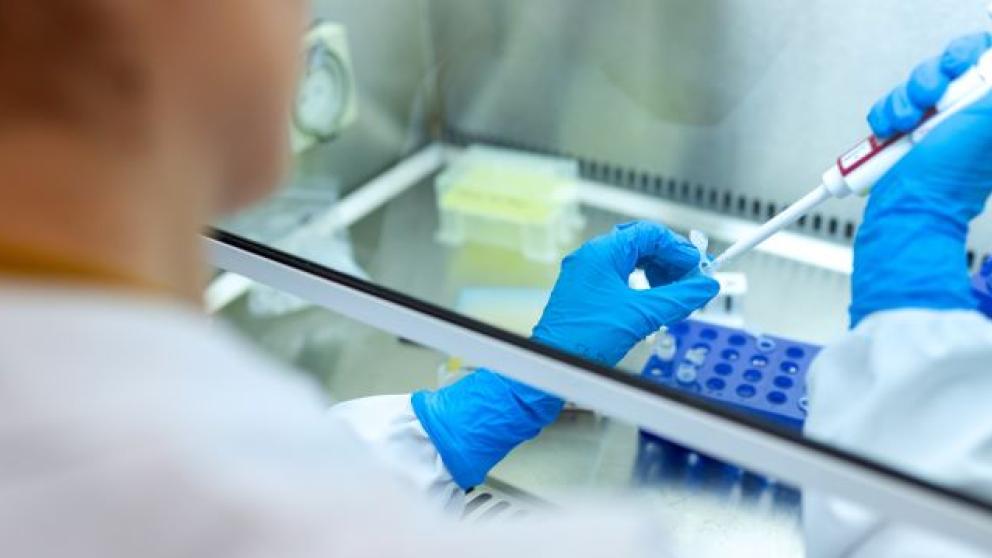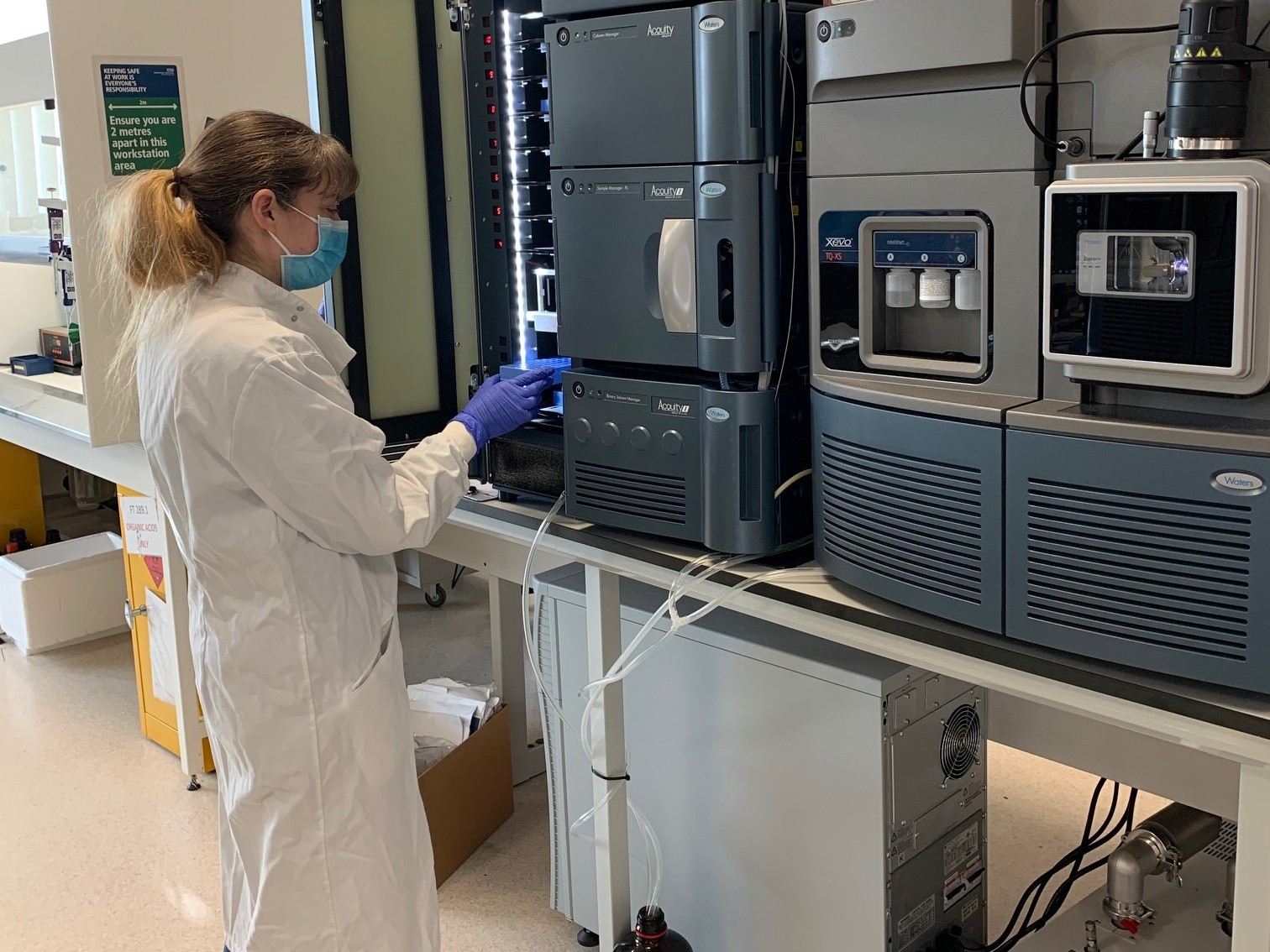Biomedicine Apprentice recognised by the University

Each year as part of the National Apprenticeship Celebrations the University of Salford awards individuals from its different schools with the accolade of Apprentice of the Year.
This year’s winner from the School of Science, Engineering and Environment is Biomedical Science Apprentice Degree (Healthcare Science Practitioner) student Christine Egerton. Christine recently completed her final (3rd) year of her apprenticeship combining her study with a full-time time role based in Manchester Foundation Trust pathology labs specialising in Biochemistry and Genetic Medicine.
Dr. Lucy Smyth, Biomedical Science lead at the University, nominated Christine with wholehearted support of the apprentice academic team. Dr Smyth said: “Since joining the Biomedical Science programme, Christine has diligently immersed herself into the academic work, gaining superb marks in many of her 2nd year and final year modules.
“Apprentices have not had an easy journey through the pandemic. Shining through the adversity means Christine can now register with the professional body, the HCPC (Health Care and Professions Council), and progress her career and perform the role of a full, registered biomedical scientist. Well respected by peers and staff, we feel Christine has truly deserved the award of Apprentice of the Year.”
Dr Smyth added: “Christine’s diligent attitude in working as an apprentice through the pandemic displays her professionalism and quiet resilience, which alongside an impressive performance in the degree’s End Point Assessment shows her merit in earning the title of Apprentice of the Year. Congratulations Christine.”
Christine’s employer, Robert Gibson, said: “Christine is a model employee. She has put a lot of hard work and effort into becoming a Biomedical Scientist. She has also had to manage her time very effectively to ensure all deadlines and objectives have been meet. Christine is an asset to the laboratory, and I am certain she will make a great success of her career as a Biomedical Scientist.”
The partnership between universities and employers are powerful enablers for collaboration and generating new opportunities. Apprenticeships ensure that students are presented new challenges in the workplace as an integrated part of their study. The programmes are designed so that apprentices remain in full time employment while being given 20% release for university study to gain their degree. The Biomedical Science Programme is the first one at The University of Salford to offer an integrated End Point Assessment (EPA) as an approved assessment organisation (AO) to the Healthcare Science Practitioner standard.
We asked Christine some questions to discover more about her apprentice degree, from the challenges of working through the coronavirus pandemic to the advantages of pursuing an apprenticeship.
What made you choose to do an apprentice degree in Biomedical Science?
I have been working at the Willink laboratory at St. Mary’s hospital in Manchester for 15 years, where I started as a Medical Laboratory Assistant and progressed to an Associate Practitioner. My career progression had come to a standstill due to not having a Biomedical Science degree. The apprenticeship opened up the opportunity for me to be able to study for my degree while also being able to continue to work.
What stood out to you about The University of Salford when you were searching for the place to study for your apprentice degree?
When I was looking into universities offering an apprenticeship scheme Salford was the most appealing as the scheme was already up and running. This meant my attendance was only required one day a week, which was a set day, during term time to attend practical sessions on campus. The advantage of this was that it enabled my employer to easily plan for my absence. The apprenticeship at Salford appeared to offer me the best opportunity to equip me with the knowledge and learning to successfully complete my degree.
Where did you complete your workplace study and what was a highlight of the work you did there?
My workplace study was carried out in the Willink Laboratory. The Willink is part of Genomic Medicine at St. Mary’s hospital in Manchester, a part of the Central Manchester Foundation Trust, and is internationally renowned for the diagnosis and treatment of patients with inherited metabolic disorders. During my final year project, I developed an alternative method for the diagnosis of Gaucher disease. The laboratory currently performs a lysosomal enzyme screen that consists of 16 enzymes being tested on a 5ml EDTA blood sample, Gaucher disease is currently tested in this screen but the method used requires a large volume of sample to perform the analysis. The method I developed requires less sample volume which enables more enzymes to be added to the screen without the patient needing to provide more sample.
Working as an apprentice through the Covid-19 pandemic must have presented a unique set of challenges. What was different and how did you adapt?
The pandemic definitely presented its own challenges – being Covid safe was a priority. While in the workplace, the mandatory wearing of face masks and social distancing was maintained. I was unable to visit other laboratories such as routine biochemistry, virology and haematology due to them not accepting students, but I don’t feel like this disadvantaged me. When there was a slight delay to the End Point Assessment (part of the apprenticeship), the University made sure it could be performed online to avoid any further delay in my registration with the IBMS (Institute of Biomedical Science). I think that studying as an apprentice during the pandemic has taught me to consider different ways of approaching challenges.
What have you enjoyed most about your workplace-based learning?
The most rewarding part was the assay development ( a laboratory investigative procedure) I carried out for my project, where I was able to learn all the different steps needed to validate an assay before it can be put into service. I also enjoyed the experience of meeting new people and networking. My placement gave me the chance to talk to people on the same journey as me and gain an insight into their work in other hospitals and experiences in other laboratories.
What are your plans for the future, and how has your apprentice degree prepared you for this?
My ambition is to secure a job as a HCPC registered Biomedical Scientist within the NHS. My workplace-based learning linked with my degree, has given me first-hand experience of what is required to be a Biomedical Scientist, and I feel that I’ve gained the confidence and knowledge to continue to develop and progress my skills. I have a real sense of achievement having completed the degree and I believe it has equipped me with the tools to carve out a good career within the field.
Image: Christine during her workplace study at the Willink Laboratory

For all press office enquiries please email communications@salford.ac.uk.
Share:
